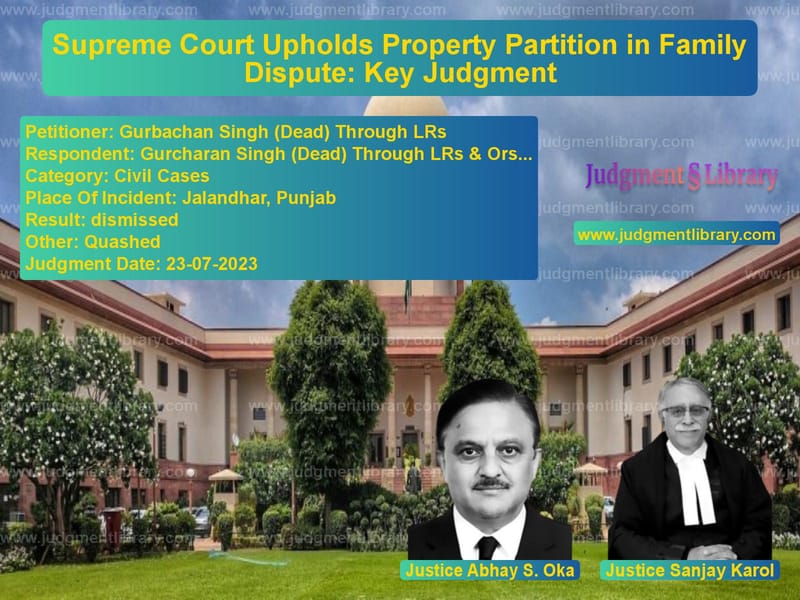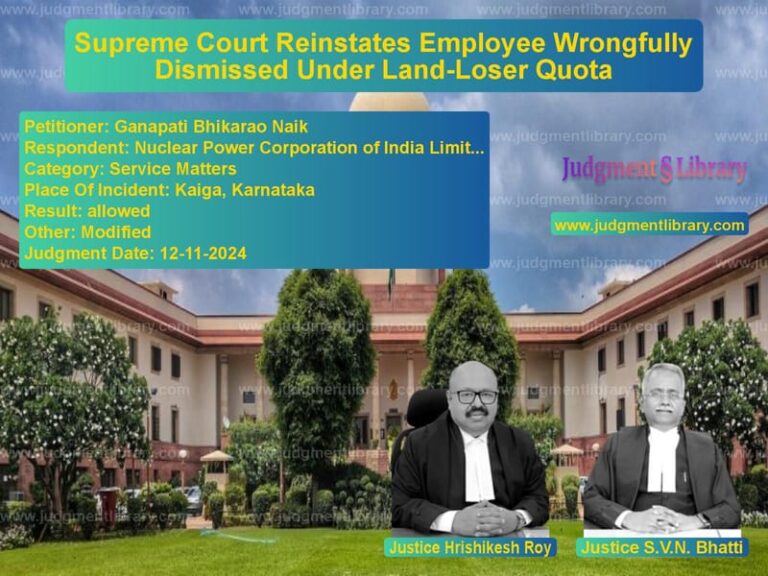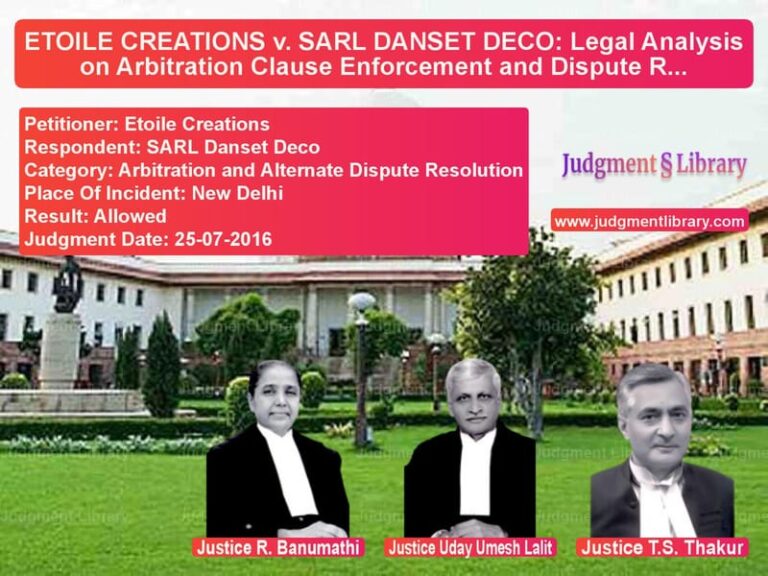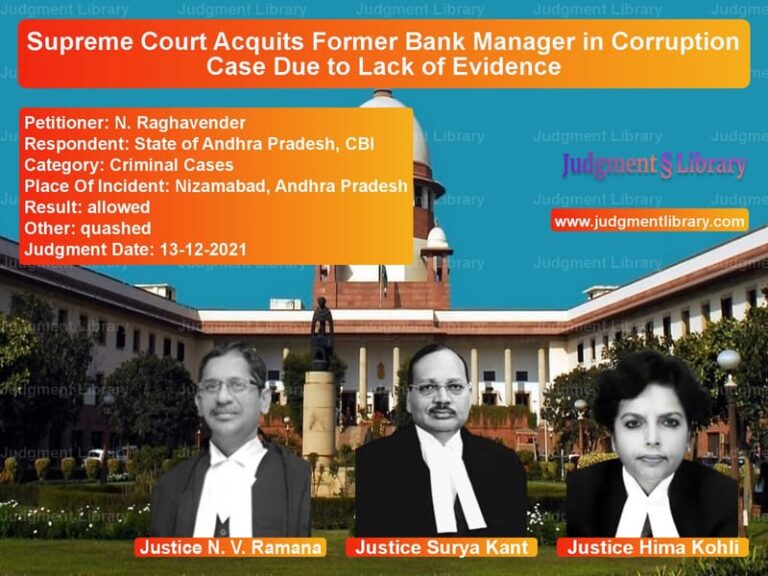Supreme Court Upholds Property Partition in Family Dispute: Key Judgment
The case of Gurbachan Singh (Dead) Through LRs v. Gurcharan Singh (Dead) Through LRs & Ors. involves a long-standing family property dispute. The Supreme Court upheld the Punjab and Haryana High Court’s decision, ruling that the partition of family property executed by the father of the litigants was valid and binding. The ruling sets a precedent on the rights of co-owners in undivided family property and the impact of past transactions.
Background of the Case
The dispute centers on a property in Jalandhar, Punjab, inherited by two brothers, Gurbachan Singh and Faqir Singh, from their father, Suchet Singh. After Suchet Singh’s death in 1942, the property remained undivided. However, in 1978, Faqir Singh sold a 4-marla portion of the property to Gurcharan Singh (the respondent) through a registered sale deed for Rs. 6,000.
Although Gurcharan Singh took possession of the property, he was later dispossessed by Gurbachan Singh, who claimed that Faqir Singh had no exclusive right to sell the property. Gurcharan Singh then filed a suit for possession before the Sub-Judge 1st Class, Jalandhar.
The trial court dismissed Gurcharan Singh’s suit, ruling that:
- No documentary evidence proved that Faqir Singh had received the property through partition.
- The revenue records did not reflect any partition between the brothers.
The Additional District Judge upheld the trial court’s ruling in 1981. However, in 2010, the Punjab and Haryana High Court reversed the lower courts’ findings, ruling in favor of Gurcharan Singh. Gurbachan Singh then appealed to the Supreme Court.
Key Legal Issues
- Was the property partitioned between Faqir Singh and Gurbachan Singh during their father’s lifetime?
- Did Faqir Singh have the legal right to sell the disputed property?
- Did the High Court exceed its jurisdiction by re-evaluating evidence in a second appeal?
Petitioner’s (Gurbachan Singh’s) Arguments
The petitioner contended:
- The Punjab and Haryana High Court had exceeded its jurisdiction by reappreciating evidence in a second appeal.
- The transaction was invalid as Faqir Singh was only a co-owner in an undivided property and had no right to sell a specific portion.
- The disputed property was an integral part of his house, and the respondent had raised construction without ownership rights.
- The High Court disregarded key rulings, such as Jai Singh v. Gurmej Singh (2009) and Ramdas v. Sitabai (2009), which establish that a co-owner can only sell their share, not a demarcated portion.
Respondent’s (Gurcharan Singh’s) Arguments
The respondent countered:
- The father had partitioned the property during his lifetime, giving Faqir Singh exclusive ownership of the sold portion.
- He had been in peaceful possession of the property after purchasing it in 1978.
- Witness statements confirmed that the property had been divided decades ago.
- Gurbachan Singh himself had sold portions of his share in the past, contradicting his claim that the property was undivided.
Supreme Court’s Observations
On the Scope of Second Appeal
The Court ruled that while second appeals should not typically re-evaluate evidence, exceptions exist when:
- Lower courts ignore material evidence.
- Findings are based on no evidence.
- Wrong inferences are drawn from proven facts.
It observed:
“The High Court had a duty to correct the lower courts’ errors when they ignored substantial witness testimonies confirming the partition.”
On the Validity of Partition
The Supreme Court analyzed witness statements and held that:
“There is clear evidence that Suchet Singh had partitioned the property during his lifetime, and both sons acted as independent owners.”
It noted contradictions in Gurbachan Singh’s statements:
- He denied partition but admitted selling part of the property to Atma Singh as an exclusive owner.
- Witnesses testified that Faqir Singh had independent possession of the disputed portion.
On the Right to Possession
The Court ruled:
“Where partition is established, a co-owner can sell a specific portion of their share. The respondent’s possession was lawful.”
Final Judgment
The Supreme Court upheld the High Court’s judgment and dismissed the appeal, ruling that:
- Gurcharan Singh had validly purchased the property.
- Gurbachan Singh had no right to dispossess him.
- The respondent was entitled to possession of the disputed land.
Implications of the Judgment
This ruling has significant implications:
- Recognition of Oral Partition: Courts may accept oral partition if supported by witness testimony.
- Rights of Co-owners: Co-owners with independent possession can sell their share.
- Limitations on Second Appeals: High Courts can intervene when lower courts ignore crucial evidence.
Conclusion
The Supreme Court’s ruling in Gurbachan Singh v. Gurcharan Singh upholds the principle that long-standing possession and partition agreements must be respected. The judgment ensures that co-owners cannot arbitrarily deny others their rightful share, reinforcing fairness in property disputes.
Read also: https://judgmentlibrary.com/supreme-court-upholds-delhi-metro-land-acquisition-rejects-lapse-claim/
Petitioner Name: Gurbachan Singh (Dead) Through LRs.Respondent Name: Gurcharan Singh (Dead) Through LRs & Ors..Judgment By: Justice Abhay S. Oka, Justice Sanjay Karol.Place Of Incident: Jalandhar, Punjab.Judgment Date: 23-07-2023.
Don’t miss out on the full details! Download the complete judgment in PDF format below and gain valuable insights instantly!
Download Judgment: gurbachan-singh-(dea-vs-gurcharan-singh-(dea-supreme-court-of-india-judgment-dated-23-07-2023.pdf
Directly Download Judgment: Directly download this Judgment
See all petitions in Property Disputes
See all petitions in Landlord-Tenant Disputes
See all petitions in Judgment by Abhay S. Oka
See all petitions in Judgment by Sanjay Karol
See all petitions in dismissed
See all petitions in Quashed
See all petitions in supreme court of India judgments July 2023
See all petitions in 2023 judgments
See all posts in Civil Cases Category
See all allowed petitions in Civil Cases Category
See all Dismissed petitions in Civil Cases Category
See all partially allowed petitions in Civil Cases Category







